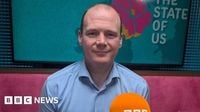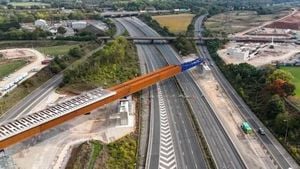Across the United Kingdom and continental Europe, tensions over immigration and race have reached a boiling point in the autumn of 2025, fueled by a complex mix of social, economic, and political pressures. In recent months, a string of high-profile incidents—from hate crimes in France to violent protests in Scotland and Northern Ireland—have thrown the spotlight on the challenges facing governments and communities alike as they grapple with the realities of migration, integration, and public sentiment.
In Serbia, police made headlines this week after arresting 11 individuals suspected of orchestrating acts of racial hatred in France and Germany. According to The Associated Press, the group is believed to have acted on instructions from an unidentified foreign intelligence service. The most shocking of these incidents involved the placement of pig heads outside nine mosques in the Paris area, with five of the pig heads marked with the surname of French President Emmanuel Macron. French authorities condemned the acts as a deliberate attempt at foreign interference, designed to provoke unrest at the heart of the nation.
Security camera footage in Paris reportedly captured two men—identified as foreign nationals—depositing the pig heads before quickly leaving France. Their car, which carried Serbian license plates, was tracked from Normandy to Belgium, and a Croatia-registered phone believed to be in use by the suspects crossed the border shortly afterward, according to the Paris prosecutor's office. While French officials stopped short of naming a specific country behind the plot, the incidents bore similarities to previous efforts linked to Russian proxies, including the defacing of a Paris Holocaust memorial in May 2024—a crime that, according to a French intelligence report cited by The Associated Press, was ordered by Russia's FSB security service.
These acts of hate are not isolated. In May 2025, a Paris Holocaust memorial, three synagogues, and a restaurant were vandalized with green paint, further stoking fears of rising antisemitism and xenophobia. Meanwhile, Serbian police revealed that the suspected organizer of the pig head campaign remains at large, and just days earlier had arrested two others allegedly connected to a plot to incite riots during a key election in Moldova. The broader context is fraught: Serbia’s President Aleksandar Vucic maintains close ties with Russia and has resisted joining European sanctions over the war in Ukraine, even as Serbia officially pursues European Union membership.
While the specter of foreign interference looms large on the continent, the UK finds itself embroiled in its own, homegrown crises over immigration and housing. Nowhere is this more evident than in Scotland and Northern Ireland, where the intersection of social policy, economic strain, and shifting public attitudes has created a combustible environment.
In Glasgow, the city with the highest proportion of housed asylum seekers in the UK—3,716, or 59 per 10,000 residents—community tensions are rising fast. According to Sky News, the cost of accommodating asylum seekers has soared to £4.5 million a month, placing an ever-growing financial burden on local authorities. Glasgow’s leaders have called for a pause on further relocations, arguing that the city’s resources are stretched to the breaking point. The city’s generous homelessness legislation, which requires councils to house anyone without a home, stands in stark contrast to the stricter policies in England, but this very generosity is now being questioned by some residents.
On the streets of Glasgow, the mood is shifting. Flags of Scottish identity flutter from balconies and lampposts, and anti-immigration sentiment is on the rise. George, a resident of the Wyndford estate, told Sky News, "We can't afford to keep all these people coming in. There's too many people coming in." Similar concerns were echoed by Audrey Cameron, a mother struggling to find housing for her son with additional needs: "I've got an older son who lives with me who can't get a house, but yet you come in to this country, and you get a house no bother. There is more black and every other colour than there is white."
Yet, experts and advocates insist that much of this anger is misdirected. Andy Sirel, an immigration lawyer and co-founder of Just Right Scotland, argued, "When a person is in the United Kingdom, they are not allowed to work, they are not allowed to claim benefits, they are not stealing your jobs. If they are in a hotel, which they don't want to be in, they are on £9 a week. It is simply not true the narrative that is being put out." Dr Teresa Piacentini of Glasgow University added, "Claiming asylum is a right. To claim asylum is not to do something illegal. You have a legal entitlement to claim asylum."
In Falkirk, about 30 miles from Glasgow, these tensions have spilled over into violence and protest. The Cladhan Hotel, home to dozens of asylum seekers, has been the scene of rallies by both anti-immigration activists and community groups like Falkirk For All, which stands in solidarity with refugees. The situation escalated after an asylum seeker was jailed for raping a local teenager, an event that further polarized the town. As one current resident of the hotel told Sky News, "I don't blame anybody. People have some valid reasons to feel angry but what is important is that we are all human beings."
Northern Ireland, too, is grappling with the fallout from a chronic housing shortage. As of June 2025, 2,228 people were housed in "dispersal" accommodation, long-term temporary housing managed for the Home Office. Communities Minister Gordon Lyons told BBC, "There is absolutely no excuse for the racism," but acknowledged that frustration is mounting among locals who have waited years for social housing while asylum seekers are accommodated in their neighborhoods. Lyons pointed out that dispersal accommodation tends to be clustered in already deprived areas, further inflaming local resentment.
Louise McCullough, chairperson of the east Belfast charity Elevate East, underscored the scale of the problem: "We have a huge homeless population, people are living on top of each other, overcrowding, and there is a real opportunity there. We need to be looking at the people who are making the decisions about building houses." According to BBC, 49,129 households in Northern Ireland were on the social housing waiting list as of mid-2025, and the government’s ambitious target of 5,850 new social homes by 2027 is in jeopardy due to budget shortfalls.
Lyons has proposed using surplus public sector land—an area the size of County Armagh—to build more social homes, arguing that if cash subsidies are unavailable, land subsidies should be provided to unlock new capacity. "There's nothing more fundamental than housing," he said, adding that the crisis "massively needs addressed."
Meanwhile, the UK Home Office claims progress in reducing the number of asylum seekers in hotels, citing a reduction of 6,000 people in the first half of 2025 and a commitment to close all asylum hotels by the end of the current parliament. Still, the gap between policy and lived experience remains wide, with local authorities and communities left to navigate the fallout.
As the autumn draws on, the intersection of migration, housing, and public sentiment continues to test the resilience of societies across Europe. Whether the solutions lie in policy reform, greater investment, or simply a renewed commitment to empathy and fact-based debate, one thing is clear: the stakes have never felt higher.




